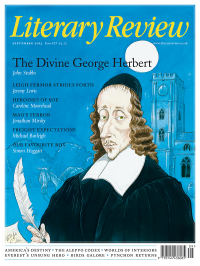Rob Turner
At the Flickering Edge
Seven American Deaths and Disasters
By Kenneth Goldsmith
powerHouse 176pp £14.99
‘Some stories never end,’ wrote Don DeLillo in 2005, reflecting upon Libra (1988), his account of the life and death of Lee Harvey Oswald. ‘Even in our time, in the sightlines of living history, in the retrieved instancy of film and videotape, there are stories waiting to be finished, open to the thrust of reasoned analysis and haunted speculation.’ Seven such haunted speculations make up the bulk of Kenneth Goldsmith’s latest book, a series of direct transcriptions lifted from radio and television news broadcasts, detailing three assassinations (John Lennon and both Kennedys), two mass murders (Columbine and 9/11) and two accidents (Michael Jackson’s death and the NASA Challenger explosion). These events are presented in chronological order and with Goldsmith’s minimal edits carefully highlighted; the book ends with a short but accurate set of ‘Technical Notes’. While many of Goldsmith’s previous works, such as Day (a transcription of an entire edition of the New York Times) were provocative gestures, deliberately unreadable bolts from the vanguard, Seven American Deaths and Disasters seems to represent an urgent – and personal – response to a set of traumatic events lying within DeLillo’s ‘sightlines of living history’. As Goldsmith notes, ‘all seven events depicted here were ones that I lived through which changed me, and a nation, forever’.
The attempt to form an adequate literary response to a catastrophe such as 9/11 has, of course, preoccupied transatlantic writing for much of the past decade, ranging from DeLillo’s own short and rather unenthusiastically received novel Falling Man (2007) to Martin Amis’s polemical collection of essays The Second Plane (2008).

Sign Up to our newsletter
Receive free articles, highlights from the archive, news, details of prizes, and much more.@Lit_Review
Follow Literary Review on Twitter
Twitter Feed
It wasn’t until 1825 that Pepys’s diary became available for the first time. How it was eventually decrypted and published is a story of subterfuge and duplicity.
Kate Loveman tells the tale.
Kate Loveman - Publishing Pepys
Kate Loveman: Publishing Pepys
literaryreview.co.uk
Arthur Christopher Benson was a pillar of the Edwardian establishment. He was supremely well connected. As his newly published diaries reveal, he was also riotously indiscreet.
Piers Brendon compares Benson’s journals to others from the 20th century.
Piers Brendon - Land of Dopes & Tories
Piers Brendon: Land of Dopes & Tories - The Benson Diaries: Selections from the Diary of Arthur Christopher Benson by Eamon Duffy & Ronald Hyam (edd)
literaryreview.co.uk
Of the siblings Gwen and Augustus John, it is Augustus who has commanded most attention from collectors and connoisseurs.
Was he really the finer artist, asks Tanya Harrod, or is it time Gwen emerged from her brother’s shadow?
Tanya Harrod - Cut from the Same Canvas
Tanya Harrod: Cut from the Same Canvas - Artists, Siblings, Visionaries: The Lives and Loves of Gwen and Augustus John by Judith Mackrell
literaryreview.co.uk